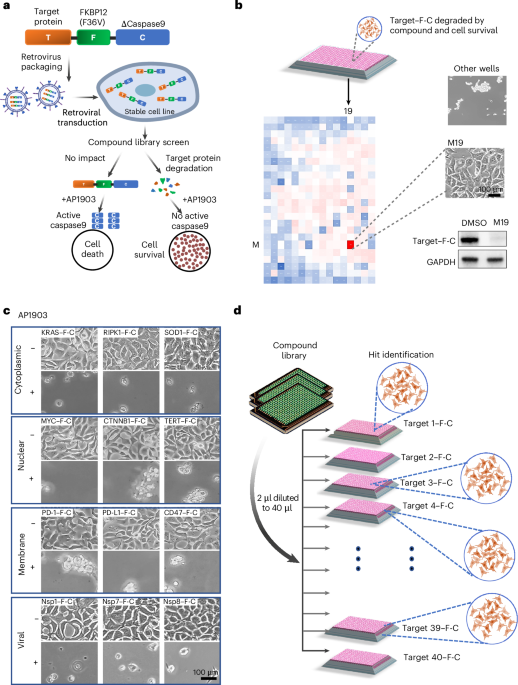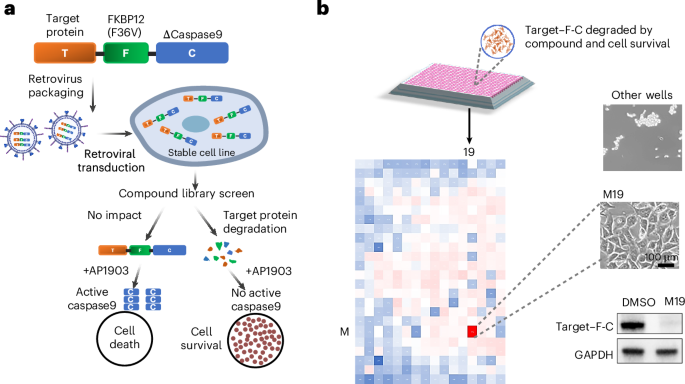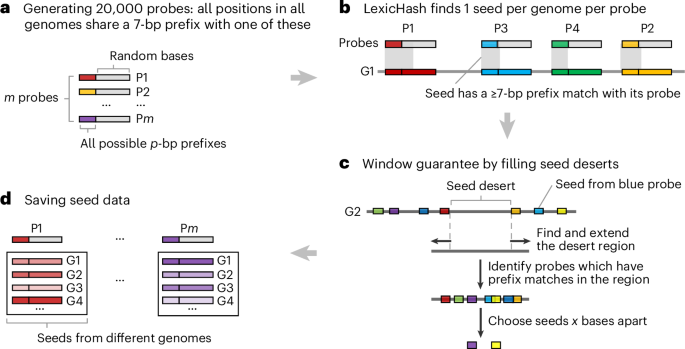Now Reading: Rapid Imaging Unveils Potent SKP2 Oncoprotein Degrader
-
01
Rapid Imaging Unveils Potent SKP2 Oncoprotein Degrader
Rapid Imaging Unveils Potent SKP2 Oncoprotein Degrader

Swift Summary:
- The study investigates advances in targeted protein degradation technology for cancer therapy, focusing on induced-proximity degraders and the oncoprotein SKP2.
- The research findings are supported by data and mass spectrometry analyses, which are accessible via Mendeley Data.
- Supplementary materials and relevant data can be accessed from the corresponding author upon request.This study does not report original code adoption in its methodology.
Indian Opinion Analysis:
Protein degradation technologies offer substantial promise in addressing complex health conditions like cancer, which is a critical issue for India given its growing disease burden. By targeting previously “undruggable” proteins, this innovation may pave the way for more effective treatments with fewer side effects-a potential breakthrough considering India’s broad pharmaceutical industry interest in cutting-edge treatments. With an integral role of researchers worldwide contributing to similar advancements, India has an possibility to integrate such methodologies locally while advancing pharma R&D capabilities nationally to alleviate health challenges efficiently.
For further details on datasets: Mendeley data linkQuick summary:
- The article discusses advancements in molecular technology, specifically focusing on the degradation of proteins through innovative approaches such as PROTACs (Proteolysis Targeting Chimeras) and molecular glues.
- These technologies aim at targeting specific proteins associated with diseases including cancer, using mechanisms like E3 ubiquitin ligase recruitment to degrade dysfunctional proteins.
- Key breakthroughs mentioned include targeting mutations like C481S ibrutinib resistance mutation and designing targeted strategies for KRASG12C protein degradation.
- Examples of successful applications include lenalidomide-induced degradation in myeloma cells and anticancer sulfonamides inducing RBM39 protein breakdown.
indian Opinion Analysis:
The exploration of targeted protein degradation technologies represents a significant milestone in biomedical research. While primarily progressing abroad, such innovations could have deep implications for India’s healthcare system. Diseases like cancer that these methods target are prevalent in India, often leading to huge socioeconomic burdens. Incorporating such novel treatments into India’s pharmaceutical landscape could improve outcomes while reducing dependency on conventional therapies with broader side effects.However, adopting this technology locally would require investments into biotech innovation hubs, workforce training, and collaboration with global research entities. Furthermore,ensuring affordability and accessibility is crucial given India’s diverse economic strata-the real test lies not just in adoption but widespread implementation across rural and urban areas.
Read more Google Scholar.It seems the raw text provided contains references and metadata from academic articles rather than specific news content about India. Without the associated article or context specific to India,it is not possible to create a “Quick Summary” or “Indian Opinion Analysis.” Could you please provide structured article text or more explicit content?Quick Summary
- The article discusses novel insights into protein degradation pathways and molecular mechanisms related to cancer biology.
- Topics include the Skp2 pathway’s role in cancer therapy, cellular progression modulation by Notch1, and the continuous evolution of targeted protein degradation techniques.
- Publications referenced span areas like ubiquitin ligases (SCF complexes), cell-cycle regulation, chaperone-mediated pathways (e.g., CHIP), Hippo signaling’s impact on ploidy suppression, and therapeutic targeting strategies for types of leukemia.
Indian Opinion Analysis
the scientific advancements outlined demonstrate a sustained focus on molecular mechanisms critical for understanding cancer therapeutics-an area India could invest heavily in. With its emerging biotech industry and affordable pharmaceutical footprint, these findings propose opportunities to explore cost-effective treatments based on these global innovations. Encouraging collaborative research with international teams may deepen India’s capability in targeted therapies, positioning it as a hub for next-generation solutions against genetic diseases and cancers.
Read more at: Google Scholar – Reference
Quick Summary
- Topic: The source text primarily discusses research findings around various molecular mechanisms and pharmacological developments in oncology, specifically focusing on cellular pathways involved in cancer progression, apoptosis, and treatment resistance.
- Main Focus Areas:
– Role of Skp2 protein in regulating cancer stem cell traits.
– use of statins like Simvastatin to arrest cancer cell cycles via the STAT3/SKP2 axis.- Curcumin’s effect on pancreatic cancer cells by inhibiting Skp2-mediated growth and promoting apoptosis.
– Research advancements regarding targeted pharmacological interventions (e.g., E3 ligase SCFSkp2/Cks1) for specific cancers such as RB1-deficient lung cancers.
Indian opinion Analysis
Research into molecular biology for oncology represents significant scientific progress with potential implications for India’s vast healthcare ecosystem. Given India’s high burden of noncommunicable diseases like cancer, these findings could pave the way for more localized treatment methodologies or provide platforms for drug progress tailored to regional epidemiology. However, success will depend heavily on translational research funding and ensuring affordability so that breakthroughs reach underserved populations effectively. Promoting collaboration between academia and biotech industries is crucial to bridge this gap in India.
For more details: Read MoreQuick Summary
- Researchers from China have developed a novel system called DEFUSE to discover small-molecule degraders targeting essential proteins for cancer treatment.
- A compound named SKPer1 has been identified as a potent degrader of the SKP2 protein, which plays a role in tumor progression.
- Studies show SKPer1 induces cell death in high-SKP2 cancer cell lines while having minimal effects on low-SKP2 cells.
- The mechanism involves degrading the SKP2 protein without requiring heat shock proteins, unlike typical pathways of protein degradation involving STUB1 modulators.
- Patent applications based on this research have been filed, and some contributors hold equity in associated ventures working on similar therapies.
Indian Opinion Analysis
The discovery of DEFUSE and its application with compounds like SKPer1 signifies substantial progress in targeted cancer therapies that may reduce undesired side effects by selectively attacking specific proteins implicated in tumor growth. While this innovation emerges from China, such developments highlight opportunities for international collaboration and underscore India’s growing role as both a consumer and contributor to global medical advances.
India’s pharmaceutical sector could benefit from exploring analogous systems for drug discovery or licensing new technologies like DEFUSE for local adaptation against endemic disease patterns.Strengthening research partnerships with nations pioneering medical innovations could position india strategically within cutting-edge biomedicine-meeting domestic needs while advancing global health contributions.Quick Summary
- The study introduces a novel technique for protein degradation using SD40 and SKP2dTAG tags.
- SD40 showed inconsistent results; degrading MYC, KRAS, SRSF2 when fused to the C-terminus but failing with ZRSR2 and U2AF1. N-terminal fusion of SD40 was unsuccessful in all cases tested.
- SKP2dTAG demonstrated universal effectiveness by degrading all five proteins MYC, KRAS, SRSF2, ZRSR2, and U2AF1 regardless of whether it was fused to the N-terminal or C-terminal.
- This approach involves selective degradation through specific compounds like PT-179 targeted at client proteins.
Indian Opinion Analysis
The research highlights advancements in precision biotechnology tools that allow selective protein degradation-a significant step forward in therapeutic applications for conditions such as cancer linked to oncoproteins like MYC and KRAS. India’s burgeoning pharmaceutical sector could benefit from leveraging this technology by enhancing its innovative drug development pipeline. Collaborative groundwork between Indian biotech firms and global researchers may expedite its application in treating diseases prevalent among populations here. From an industry-wide outlook, adopting such transformative approaches aligns with India’s goal of leading personalized medicine efforts globally while stimulating local R&D capacity development.
Read more: Source dataQuick Summary:
- The news article discusses advancements in biotechnology and research related to India.
- A study published on 10 September 2025 is available in the Nature Biotechnology journal under DOI: https://doi.org/10.1038/s41587-025-02793-8.
- Further details can be accessed by following the provided link to the full research article.
Indian Opinion Analysis:
Biotechnology remains a critical area of development for India’s scientific community, with implications for sectors like agriculture, healthcare, and environmental sustainability. The publication in a prestigious journal such as Nature Biotechnology highlights India’s contribution or potential impact on global scientific discourse. This achievement could bolster India’s position as a hub for cutting-edge research if adequately supported by investment,collaboration,and policy infrastructure aimed at scaling innovations locally and globally.




























